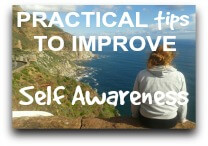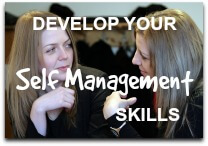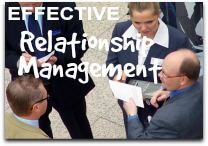- Home
- Emotional Intelligence
- Social Awareness
Social Awareness
By Mark Connelly
Updated: 12 September 2020
Social awareness gives you the ability to understand and respond to the needs of others. Improve your social skills and gain the respect of others as you apply the ideas on this page.
Understanding other people's feelings is central to emotional intelligence. Get it wrong and you'll be seen as uncaring and insensitive.
Getting it right is essential for success.
Social Awareness meets
Emotional Intelligence
Emotional intelligence consists of four basic capabilities, or domains. These are:
- Self Awareness
- Self Regulation
- Social Awareness (this page)
- Relationship Management
This page focuses on social awareness - the ability to understand and respond to the needs of others. This is the third of the domains of emotional intelligence proposed by Daniel Goleman.
Use the links above to find out about the other domains or get an overview of emotional intelligence here.
Social Awareness
The waiter who suggests something better from the menu...
...the salesperson who goes the extra mile...
...the supportive team leader...
...and the executive that remembers your name -
...each of these have one thing in common...
They excel in social awareness.
According to Daniel Goleman the competencies associated with being socially aware are:
- Empathy: understanding the other person’s emotions, needs and concerns.
- Organizational Awareness: the ability to understand the politics within an organization and how these affect the people working in them.
- Service: the ability to understand and meet the needs of clients and customers.
Awareness of social situations means you carefully consider what people want, and plan to communicate with them in a way that is intended to meet that need.
Is this the same as manipulation? I'm not sure.
Great leaders and public speakers are skilled in this ability. It helps them build support.
I don't believe social awareness is intended to be quite as calculated as manipulation. At best being socially aware is a natural response to people, taking their situation and needs into account as much as possible.
Caring 2.0
Research reported in Scientific American suggests that our levels of empathy - the ability to understand the feelings of others - are lower today than 30 years ago.
An increase in social isolation is one theory used to explain this finding.
Digital communication, social networking, video conferencing and other forms of new media contribute to social isolation and are often blamed for the reduction in empathy.
After all, it's much easier to say negative things about others if you don't have to say it to their face. And if I don't feel like engaging in your problems, I can simply log off, or even 'unfriend' you. It's an easy option.
The trouble is that when there is no empathy, when we don't work to understand the needs of others, there is a significant loss of trust.
If I don't really know what you're thinking and feeling I trust you less, and isolate myself more. This can have major implications for business where trust is essential for successful leadership and partnerships.
Understanding = Trust
More importantly though, when you respond to the needs and feelings of other people, you gain their trust.
Others will be labelled uncaring and insensitive, but you are trusted when you're able to understand and respond to the needs and values of individuals, and the group.
This is true whether you're a salesperson dealing with the public, or a leader in an organization.

Photo courtesy of WOCinTech Chat
Empathy
Leaders in organizations have traditionally viewed empathy with suspicion, thinking that there is no place for soft emotional skills in the tough world of business.
My experience is that managers worry that employees will take advantage of them if they show any empathy.
But changing times and the need to consider the feelings of employees has led to social awareness becoming a critical skill for effective leaders.
This has even impacted the training given to doctors. Today doctors are trained to formulate a bio-psycho-social understanding of the problem rather than treating patients purely as a diagnosis.
A quick note...
Empathizing with someone - understanding their point of view - doesn't mean you have to agree with their point of view.
Empathy is really about acknowledging the emotions of others, being thoughtful and considerate of their feelings, and making decisions that take those feelings into consideration.
Too much empathy?
Your ability to connect with and understand others is an important skill. But it's important to control this so it doesn't become a burden on you.
Some of us find it really easy to empathize with others. And it is always appreciated.
But did you know that getting over-involved in the problems people share with us can lead to you feeling emotionally exhausted? While we're looking after the emotions of others we forget to look after our own emotional well-being.
That doesn't sound emotionally intelligent to me!
If this is you then it's in your best interest to learn transform your empathy into something more controllable.
How to build social awareness
- Improve your listening skills. Take a short course in effective communication skills.
- Pay close attention to interactions with other people. Be aware of what they say, how they say it and what they do.
- Use a gentle self hypnosis audio download to improve your ability to understand others.
- Identify other people’s emotional states. Listen carefully to what they're saying and notice how they respond to external events, such as someone greeting them or asking them to do something.
- Think about your feelings. How does the other person’s emotion make you feel?
- Think before you answer and give clear answers.
Try ThisPay close attention to your interactions with other people. Ask yourself the following questions:
|
Sensitivity and diversity
Being socially aware is important as it affects your response to people and situations.
The starting place for becoming socially aware is
self awareness.
Self awareness is essential in order to understand the feelings and emotions of others while
self management is necessary to ensure that your response is appropriate to the situation.
An empathic response requires awareness of diversity and a sensitivity to the needs and emotions of others.
Diversity encompasses acceptance and respect while recognising our individual differences and uniqueness.
Open communication plays an essential role in managing diversity and building an awareness of social situations.
Everything starts with an 'E'
I always enjoyed grafitti I saw years ago that said "Everything starts with an 'E'.
While it's true that the word 'everything' starts with an 'e' I've discovered that empathy always starts with 'u' - (you).
Mother Teresa (1910-1997) told us that empathy has to start with us.
She said 'Do not wait for leaders; do it alone, person to person'. This advice comes from one of the best voices for social awareness that we can listen to.
Social awareness is a key element of your emotional intelligence. Don't complain about people who are not understanding of your needs. Focus rather on growing your emotional intelligence and practicing empathy, service and organizational awareness yourself.
Being socially aware is an essential building block for emotional intelligence.
Practicing attention to social situations is a habit that closely corresponds with Stephen Covey's Habit 5...
"Seek first to understand, then to be understood".
The more it's practiced the more likely it is to become a habit.
As we improve social awareness we also improve our experience of life, create opportunities for better work life balance, become aware of other peoples emotions, and improve our ability to respond to change.
Leave your thoughts below and keep in touch by visiting our Facebook Page and clicking 'Like' to join the community.
- Home
- Self Awareness
- Social Awareness
- Home
- Self Regulation
- Social Awareness
- Home
- Relationship Management
- Social Awareness




